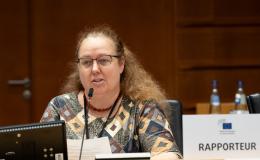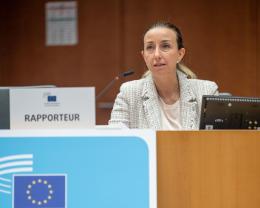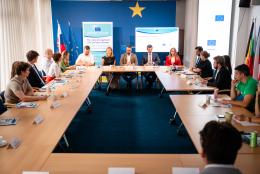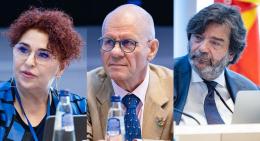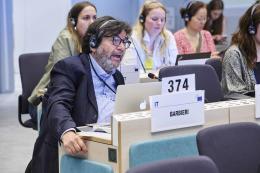European Economic
and Social Committee
Main navigation
-
Chi siamo
ABOUT
The European Economic and Social Committee (EESC) is the voice of organised civil society in Europe.
Find out more about its role and structure at http://www.eesc.europa.eu/en/about
- Organizzazione politica
- Organizzazione amministrativa
- COOPERAZIONE CON ALTRE ISTITUZIONI
- Rules
-
Attività
OUR WORK
The EESC issues between 160 and 190 opinions and information reports a year.
It also organises several annual initiatives and events with a focus on civil society and citizens’ participation such as the Civil Society Prize, the Civil Society Days, the Your Europe, Your Say youth plenary and the ECI Day.
Find the latest EESC opinions and publications at http://www.eesc.europa.eu/en/our-work/opinions-information-reports/opinions and http://www.eesc.europa.eu/en/our-work/publications-other-work/publications respectively.
- Pareri e relazioni informative
- Documenti
- Pubblicazioni e altri lavori
-
Società civile e partecipazione dei cittadini
- Civil Society Week
- European elections 2024
- Premio per la società civile
- The Conference on the Future of Europe
- Passaporto europeo per la democrazia
- La vostra Europa, la vostra opinione!
- Iniziativa dei cittadini europei (ICE)
- The path to our industrial future
- Youth Climate and Sustainability Round Tables
- EU Organic Awards
- Civil Society Against COVID 19
- EESC stands with Ukraine
- Partnerships
- Relations with ESCs
-
Politiche
POLICIES
The EESC is active in a wide range of areas, from social affairs to economy, energy and sustainability.
Learn more about our policy areas and policy highlights at http://www.eesc.europa.eu/en/policies
-
Settori
- Agricoltura, sviluppo rurale e pesca
- Azione per clima
- Politica di coesione, regionale e urbana
- Consumatori
- Trasformazioni digitali e società dell'informazione
- Unione economica e monetaria
- Istruzione e formazione
- Occupazione
- Energia
- Imprese
- Ambiente
- Relazioni esterne
- Servizi finanziari e mercati dei capitali
- Diritti fondamentali e diritti dei cittadini
- Housing
- Industrie e trasformazioni industriali
- Affari istituzionali e bilancio dell'UE
- Migrazione e asilo
- Ricerca e innovazione
- Servizi di interesse generale
- Mercato unico
- Affari sociali
- Sviluppo sostenibile
- Fiscalità
- Trasporti
-
Settori
-
Calendario dei lavori
AGENDA
The EESC holds nine plenary sessions per year. It also organises many conferences, public hearings and high-level debates related to its work.
Find out more about our upcoming events at http://www.eesc.europa.eu/en/agenda/our-events/upcoming-events
- I nostri eventi
-
Notizie e media
NEWS & MEDIA
Here you can find news and information about the EESC'swork, including its social media accounts, the EESC Info newsletter, photo galleries and videos.
Read the latest EESC news http://www.eesc.europa.eu/en/news-media/news and press releases http://www.eesc.europa.eu/en/news-media/press-releases
- Presidente
-
Membri e gruppi
MEMBERS & GROUPS
The EESC brings together representatives from all areas of organised civil society, who give their independent advice on EU policies and legislation. The EESC's326 Members are organised into three groups: Employers, Workers and Various Interests.
Find out more about our Members and groups at http://www.eesc.europa.eu/en/members-groups
- Membri
- Gruppi
-
Sezioni e altri organi
SECTIONS & OTHER BODIES
The EESC has six sections, specialising in concrete topics of relevance to the citizens of the European Union, ranging from social to economic affairs, energy, environment, external relations or the internal market.
Find out more at http://www.eesc.europa.eu/en/sections-other-bodies
-
Sezioni / Commissione
- Unione economica e monetaria, coesione economica e sociale (ECO)
- Mercato unico, produzione e consumo (INT)
- Trasporti, energia, infrastrutture, società dell'informazione (TEN)
- Occupazione, affari sociali, cittadinanza (SOC)
- Agricoltura, sviluppo rurale, ambiente (NAT)
- Relazioni esterne (REX)
- Commissione consultiva per le trasformazioni industriali (CCMI)
- Osservatori
- Altri organi
-
Sezioni / Commissione
- Ukraine


